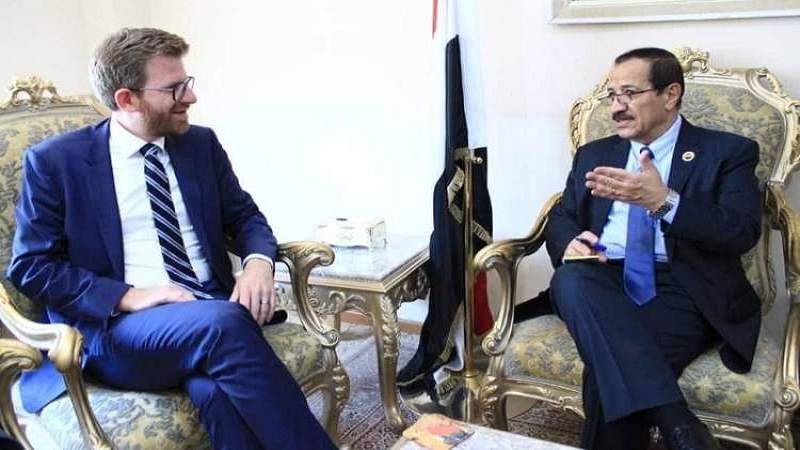Foreign Affairs Minister Calls on ICRC to Increase Its Humanitarian Assistance in Yemen

News - Yemen: Foreign Minister Hisham Sharaf Abdullah called on the International Committee of the Red Cross (ICRC) to increase its humanitarian assistance in light of the increasing number of people in need of assistance and those affected by the repercussions of the humanitarian catastrophe created by the US-Saudi aggression and the comprehensive siege.
Sharaf’s remarks came during his meeting on Sunday with the Director of Operations of the ICRC in Geneva Martin Schüepp and his accompanying delegation, who are currently visiting Yemen.
Sharaf stressed that addressing the repercussions of the humanitarian catastrophe created by the US-Saudi aggression consists in ending the military aggression, lifting the comprehensive siege and the exit of foreign forces.
“In order to achieve this goal, it is necessary to relieve the citizens and take necessary and urgent measures, foremost of which is not placing obstacles in front of the entry of ships loaded with oil and domestic gas to the port of Hodeidah,” Minister Sharaf said. “As well as not obstructing the arrival and departure of civil and commercial aviation to and from Sana’a International Airport.”
The Minister of Foreign Affairs stressed the importance of taking the necessary steps to arrange the payment of the salaries of state employees without exception.
In turn, the Director of Operations of the ICRC explained that the deteriorating humanitarian situation in Yemen is of interest to the Committee. He pointed out that the ICRC seeks to provide the necessary humanitarian aid in accordance with its financial resources.
Saudi Arabia, backed by the United States and regional allies, launched the war on Yemen in March 2015, with the claim of bringing the government of former Yemeni president Abd Rabbuh Mansour Hadi back to power.
The war has left hundreds of thousands of Yemenis dead, and displaced millions more. It has also destroyed Yemen’s infrastructure and spread famine and infectious diseases there.
The war has killed hundreds of thousands of Yemenis and spawned the world’s worst humanitarian crisis.
The war has had dire consequences on the country's economy, causing a drop in its gross domestic product from $35.7 billion in 2014 to $20.1 billion in 2019.
Reports evaluating the impact of the war on Yemen issued by the United Nations Development Program expected the country’s gross domestic product to reach $100.3 billion in 2030.
During the first five years of the war on Yemen 2015-2019, the losses amounted to 15.6 billion dollars, bringing the GDP in that year to 20.1 billion dollars.
Reports confirm that the per capita GDP growth rate has begun to improve since 2014, the year during which Yemen witnessed the outbreak of the September 21 revolution.
The economic effects of the war and the blockade imposed on Yemen also included the so-called economic output losses, which amounted to $88.8 billion during 2019.
As a result of the war and siege, the Yemeni economy lost nearly $90 billion during the period from 2014 to 2020, as it lost a large part of the capital for the public and private sectors, which represents the summary of work and economic achievements over the past decades.
Expectations indicate that the economy of Yemen, which is going through very critical conditions, after the rates of cumulative decline in macroeconomic indicators reached their worst stage, will continue to decline as long as the war and siege continue.
Preliminary estimates of the World Bank indicate that the financing requirements necessary for the recovery of the Yemeni economy are estimated at 88 billion dollars, at 17.6 billion dollars annually for a period of 5 years.
The real GDP of Yemen shrank by about 46 percent during the period 2015-2020, and the cumulative losses in the real GDP amounted to about $49.8 billion during the same period.
The World Bank estimated that between 71 to 78 percent of Yemenis, representing 21 million people, were included below the poverty line at the end of 2019.
The economic war waged by the countries of the coalition of aggression against the Yemeni people has caused a rise in the prices of basic foodstuffs and social services, which has led to an increase in poverty and the risk of starvation for millions of people.
#Yemen #US-Saudi Aggression #ICRC About 2 years
-
07:13
Mujahideen Movement: Who should be listed as terrorists are Netanyahu, his army, and his criminal government, charged by the ICC
07:12
Mujahideen Movement: The US decision is a badge of honor for Ansarullah, proof that they are on the right path
07:10
Mujahideen Movement: Yemeni support for Gaza is a noble act to stop genocide against a besieged people, something the world has failed to do
06:53
Palestinian Mujahideen Movement: We condemn the US labeling Ansarullah as terrorists for supporting Palestine
07:37
Al-Rowaishan: We affirm that Yemen faced attempts and pressures, but it only responded when the aggression against Gaza stopped.





